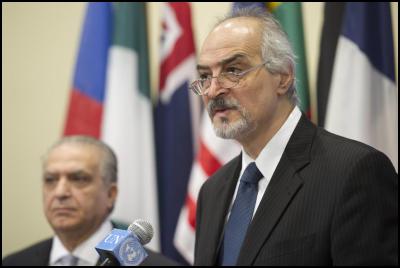Resolution targeting sources of financing for ISIL
Security Council approves resolution targeting sources of financing for ISIL

Ambassadors representing two countries under attack from ISIL, Bashar Ja’afari (right) of Syria, and Mohamed Ali Alhakim of Iraq, speak to journalists following the adoption of a Security Council resolution targeting sources of financing for the group. UN Photo/Mark Garten
12 February 2015 – Urging global cooperation “to impair, isolate and incapacitate” terrorist threats, the United Nations Security Council today approved measures targeting sources of funding for the Islamic State of Iraq and the Levant (ISIL) and Al-Nusrah Front (ANF), condemning those buying oil from the groups, banning all trade in looted antiquities from Iraq and Syria, and calling on States to end ransom payments.
Unanimously adopting a Russian-led resolution, the Council reiterated its deep concern that oilfields, as well as other infrastructure such as dams and power plants, controlled by ISIL, ANF and other Al-Qaida-associated groups, “are generating a significant portion of the groups' income, alongside extortion, private foreign donations, kidnap ransoms and stolen money from the territory they control.”
As such, the Council, acting under Chapter VII of the UN Charter – which authorizes the use of force – condemned any engagement in direct or indirect trade, in particular of oil and oil products, and modular refineries, with ISIL, ANF and Al-Qaida affiliates, and reiterated that “such engagement would constitute support for such individuals, groups, undertakings and entities and may lead to further listings” by the relevant Sanctions Committee.
Today’s resolution, which bolsters the Council’s previous measures to cut off financing for ISIL and its affiliates, reaffirms the existing obligations of Member States to “freeze without delay” funds and other financial assets or economic resources of persons who commit, or attempt to commit, terrorist acts.
Coming in the wake of a spate of particularly vicious killings, including the beheading of a Japanese journalist and the immolation of a Jordanian pilot by ISIL in the past two weeks, the Council’s resolution reaffirms its condemnation of kidnapping and hostage-taking committed by the groups, further strongly condemns abduction of women and children, and expresses “outrage at their exploitation and abuse, including rape, sexual abuse, forced marriage.”
The resolution also condemns the destruction and smuggling of cultural heritage in Iraq and Syria by ISIS and ANF, “whether such destruction is incidental or deliberate, including targeted destruction of religious sites and objects.” It also notes with concern that the groups are generating income from engaging directly or indirectly in the looting and smuggling of cultural heritage items.
Against that backdrop, the Council decided “that all Member States shall take appropriate steps to prevent the trade in Iraqi and Syrian cultural property and other items of…historical, cultural, rare scientific and religious importance illegally removed from Iraq since 6 August 1990 and from Syria since 15 March 2011.” Encouraging steps to ensure such items are returned to their homelands, the Council called on the UN Educational, Scientific, and Cultural Organization (UNESCO), Interpol, and other international organizations to assist in such efforts.
The resolution goes on to reaffirm that payment of ransoms to individuals, groups, undertakings or entities on the Al-Qaida Sanctions List, regardless of how or by whom the ransom is paid is considered a violation of international legal obligations. It calls upon all UN Member States to encourage private sector partners to adopt or to follow relevant guidelines and good practices for preventing and responding to terrorist kidnappings without paying ransom. Gravely concerned at the role of external donations in developing and sustaining ISIS and ANF, the Council urges States to take steps to ensure that financial institutions within their territory prevent these groups from accessing the international financial system.
Just after the resolution was adopted, UNESCO Director-General, Irina Bokova, welcomed the measure’s explicit condemnation of destruction of cultural heritage and its approval of legally-binding measures to counter illicit trafficking of antiquities and cultural objects from Iraq and Syria.
Calling the resolution a “milestone for enhanced protection of cultural heritage in Iraq and Syria,” she said that pillage and destruction of the countries’ culture has reached an unprecedented scale. “It fuels the conflict by providing revenues for armed groups and terrorists. This resolution acknowledges that cultural heritage stands on the frontline of conflicts today, and it should be placed on the frontline of the security and political response to the crisis,” she added.
Welcoming the explicit role attributed to UNESCO by the Security Council, the Director-General reaffirmed the agency’s organization’s commitment “to stand by Member States to ensure the full respect of the UNESCO 1970 Convention on the Means of Prohibiting and Preventing the Illicit Import, Export and Transfer of Ownership of Cultural Property”.
ENDS


 ITUC: Trade Unions In Action Against Gender-based Violence - 16 Days Of Activism
ITUC: Trade Unions In Action Against Gender-based Violence - 16 Days Of Activism 350.org: Climate Movement Holds Steadfast As Wealthy Nations Fail To Deliver On Climate Finance At COP29
350.org: Climate Movement Holds Steadfast As Wealthy Nations Fail To Deliver On Climate Finance At COP29 COP29: Statement From COP29 Presidency
COP29: Statement From COP29 Presidency UN News: ICC Issues Arrest Warrants For Netanyahu, Gallant And Hamas Commander
UN News: ICC Issues Arrest Warrants For Netanyahu, Gallant And Hamas Commander RNZ: Samoan Local Upset With Lack Of Manawanui Updates
RNZ: Samoan Local Upset With Lack Of Manawanui Updates Pacific Whale Fund: Groundbreaking Whale Rights Law Inspired By Māori King's Legacy To Be Unveiled In London
Pacific Whale Fund: Groundbreaking Whale Rights Law Inspired By Māori King's Legacy To Be Unveiled In London